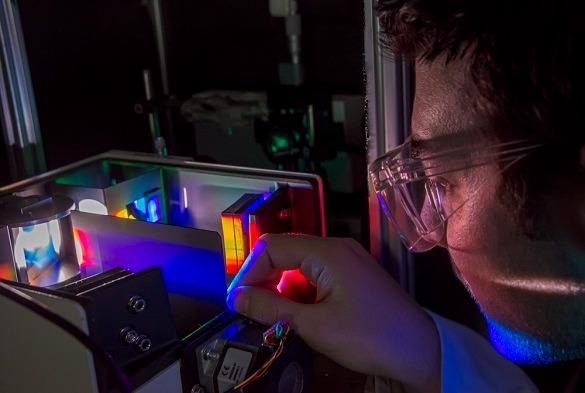
Image Credit: University of Liverpool.
Dr Alex Neale, lead author of the study who is also with SIRE, explained that the study shows that the reactivity of some electrolyte components could be turned off by accurate control of component ratios.
The ability to precisely formulate the electrolyte using readily-available, low volatility components enabled us to specially tailor an electrolyte for the needs of metal-air battery technology that delivered greatly improved cycle stability and functionality.
Dr Alex Neale, Study Lead Author, University of Liverpool
“The outcomes from our study really show that by understanding the precise coordination environment of the lithium-ion within our electrolytes, we can link this directly to achieving significant gains in electrolyte stability at the Li metal electrode interface and, consequently, enhancements in actual cell performance,” added Neale.
Dr Pooja Goddard from Loughborough University’s Department of Chemistry stated, “It was exciting to see through the use of both calculations and experimental data we were able to identify the key physical parameters that enabled the formulations to become stable against the lithium metal electrode interface.”
New benchmark formulations will be offered by the developed electrolytes that will assist current analyses inside the research groups to comprehend and develop new, practically viable cathode architectures to decrease round-trip inefficiencies and additionally extend cycle lifetimes.
This work exemplifies a useful electrolyte design strategy for Li-air batteries underpinned with excellent science within a great collaboration. This moves us another step closer towards practical routes to overcome complex Li-air challenges.
Enrico Petrucco, Johnson Matthey PLC
The collaborative study between the two University research groups in Liverpool and Loughborough and Johnson Matthey PLC was enabled by the support from an Innovate UK Grant that allows industry and academia to function jointly to handle technology-focused research difficulties.
The study has profited from battery research and characterization facilities at the Stephenson Institute for Renewable Energy, University of Liverpool, the Imaging Centre at Liverpool, and the EPSRC National Facility for X-ray Photoelectron Spectroscopy (“HarwellXPS”).
Journal Reference:
Neale, A. R., et al. (2021) Design Parameters for Ionic Liquid-Molecular Solvent Blend Electrolytes to Enable Stable Li Metal Cycling Within Li-O2 Batteries. Advanced Functional Materials. doi.org/10.1002/adfm.202010627.